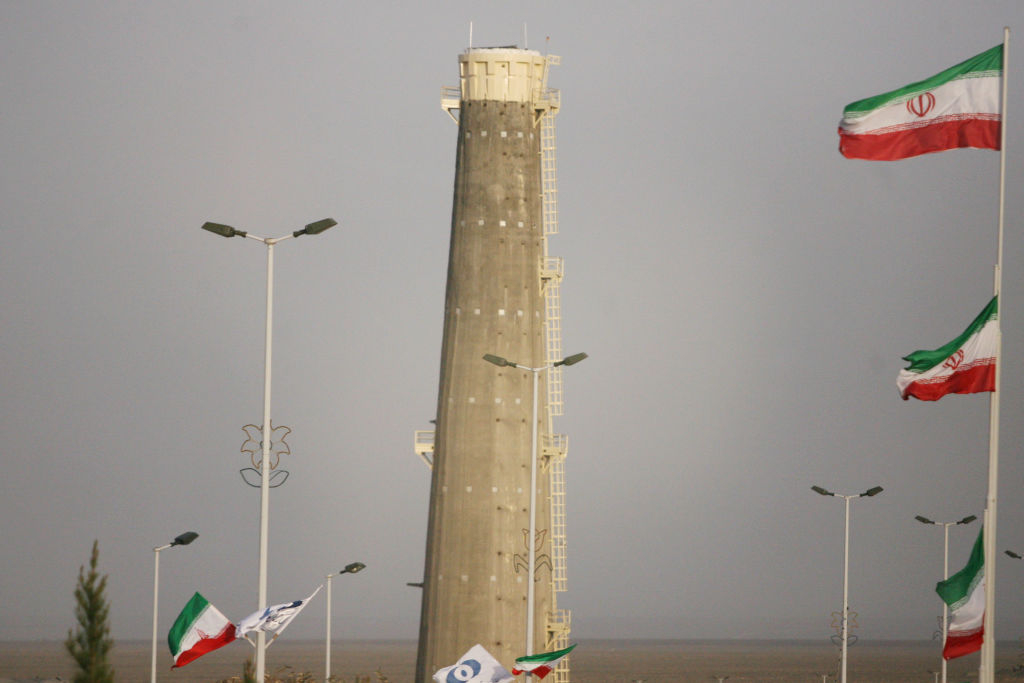 The Iranian government is advancing its nuclear program at a faster pace. Recently, the Atomic Energy Organization of Iran declared that Tehran has activated advanced centrifuges. Pictured: The Natanz nuclear enrichment facility in Iran. (Photo by Majid Saeedi/Getty Images) |
The Iranian government is advancing its nuclear program at a faster pace. Recently, the Atomic Energy Organization of Iran (AEOI) declared that Tehran took the third step in increasing its nuclear activities by activating advanced centrifuges: 20 IR-4 and 20 IR-6 centrifuges.
The previous two steps that Tehran took included: increasing the enriched uranium stockpile beyond the 300kg cap, which was set by the Joint Comprehensive Plan of Action (JCPOA), and enriching uranium to levels beyond the limit of 3.67 percent.
As part of its rush to a nuclear breakout capability, the Islamic Republic of Iran is also expanding its research and development work beyond the limitations set by the JCPOA. Iranian nuclear agency spokesman Behrouz Kamalvandi told a televised news conference, "We have started lifting limitations on our Research and Development imposed by the deal ... It will include development of more rapid and advanced centrifuges."
The ruling mullahs are claiming that Iran's recent moves and violations of the nuclear deal are the fault of the US government, because the Trump administration withdrew from the JCPOA, but the claim is a lie. New evidence shows that Iran's theocratic establishment was most likely violating the nuclear agreement since the day the Obama administration and Tehran struck the deal in 2015.
To clarify: Do you remember when the Israeli Prime Minister Benjamin Netanyahu urged International Atomic Energy Agency (IAEA) Director-General Yukiya Amano immediately to inspect an "atomic warehouse" in Iran last year?
Netanyahu stated in his speech to the UN General Assembly that Iran had a "secret atomic warehouse for storing massive amounts of equipment and material from Iran's secret nuclear weapons program." Tehran claimed that the warehouse, which is located in a village (Turquz Abad) in the suburbs of Tehran, was a place where carpets were cleaned.
At the same time, two non-partisan organizations based in Washington, DC -- the Institute for Science and International Security (ISIS) and the Foundation for the Defense of Democracies (FDD) -- released detailed reports about Iran's undeclared clandestine nuclear facilities as well.
The IAEA first ignored the reports. This should not come as a surprise: the IAEA has a long history of misreporting the Islamic Republic's compliance with the deal and declining to follow up on credible reports about Iran's illicit nuclear activities. Iran's clandestine nuclear sites in Natanz and Arak were revealed by the opposition group, the National Council of Resistance of Iran.
In any event, after a significant amount of pressure was imposed on the IAEA, and after the IAEA's chief passed away and Iran was reportedly able to moving the suspected materials out of the secret nuclear facility, inspection of the site was recently implemented.
What was the outcome? Even though the Iranian leaders had cleaned up the facility, the IAEA's inspectors were able to detect traces of radioactive uranium at the site. Israel's warning and other reports had proved accurate.
Now, Tehran is declining to answer the IAEA's questions about the secret facility. More importantly, one of the most basic requirements of the nuclear deal (while it lasted) was that Iran had to reveal its nuclear activities to the IAEA -- a condition with it even overtly failed to comply.
In other words, the detection of radioactive particles in Turquz Abad, Iran's reluctance to answer simple questions about the secret facility and non-partisan evidence about Iran's nuclear activities at the location, all point to the fact that Tehran was most likely violating the nuclear deal since it was reached.
Where, you may ask, are the strong advocates of the nuclear deal after the new evidence revealed that Iran has long been violating the nuclear deal and pursuing its nuclear ambitions? They are silent.
The international community would truly do itself a great service to recognize that the nuclear deal was nothing more than a pro-mullah agreement which provided Iran's ruling clerics with billions of dollars to pursue their anti-American, anti-Semitic, anti-Iranian people and pro-terror activities, while simultaneously providing cover for Iran to pursue its nuclear ambitions.
Dr. Majid Rafizadeh is a business strategist and advisor, Harvard-educated scholar, political scientist, board member of Harvard International Review, and president of the International American Council on the Middle East. He has authored several books on Islam and US foreign policy. He can be reached at Dr.Rafizadeh@Post.Harvard.Edu


